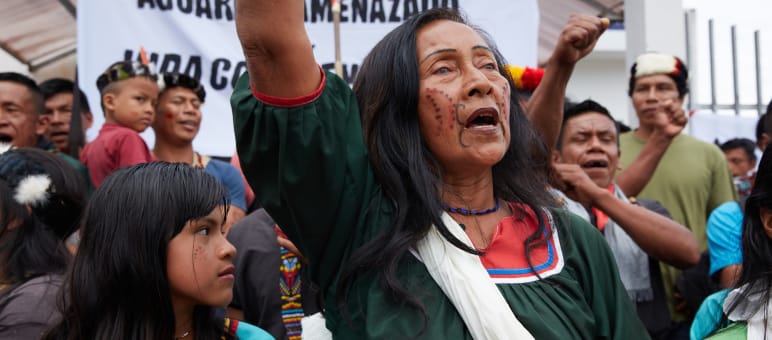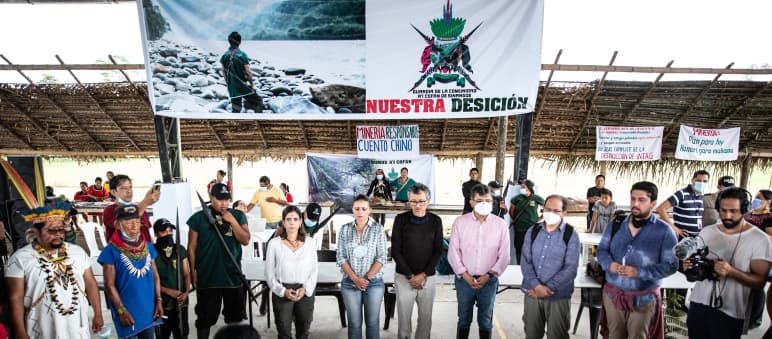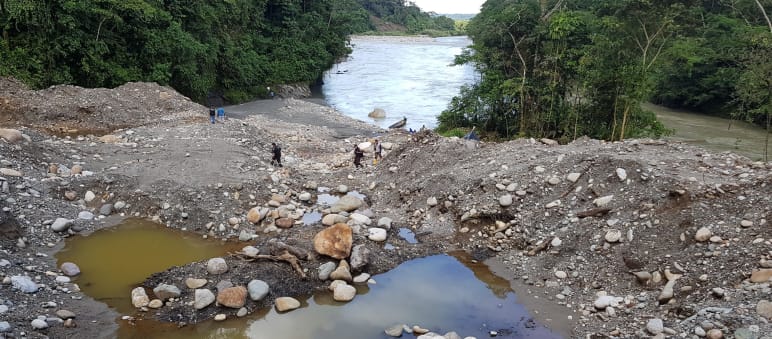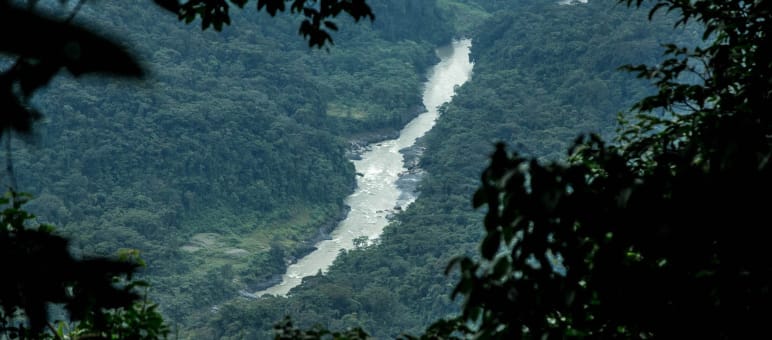Ecuador: Constitutional Court backs indigenous people in fight against gold mining
: The indigenous A'i Cofán have the right to freely decide the future of their ancestral lands in the Amazon. The country's highest court ruled that more than 50 gold mining concessions in the A'i Cofán rainforest must be revoked. The judgment sets an important precedent and greatly strengthens the protection of nine million hectares of indigenous territories in Ecuador's Amazon region.
In the Ecuadorian Amazon region, near the border with Colombia, the A'i Cofán indigenous community has been fighting for their ancestral land, nature and their rights as guaranteed in the country's constitution. One of the focal points of their resistance is the village of Sinangoe, located on the Aguarico River in western Sucumbíos province.
For years, the people have opposed gold mining concessions granted on their ancestral lands by the Ministry of Mines. They have also taken legal action to this end – and the lower courts have ruled in their favor in several cases. Yet the authorities have not recognized and implemented the verdicts.
On January 27, 2022, the Ecuadorian Constitutional Court finally ruled in favor of the indigenous people: the more than 50 gold mining concessions granted on the land of the A'i Cofán must be revoked immediately. In addition, restoration and repair measures already imposed by previous courts must be implemented by the authorities.
The South American country's highest court explicitly set a precedent with its ruling: it recognizes the right of all indigenous peoples and nations to free, prior and informed consent. They must not only be fully informed and consulted about planned activities affecting their areas, but must also expressly agree to them. The court thus greatly strengthens the protection of nine million hectares of indigenous territories in the Amazon region of Ecuador.
Background: a long legal road
In 2018, the head of the community of Sinangoe, together with the provincial delegate of the Ombudsman Office of Sucumbíos, filed a lawsuit against the Ministry of Mines, the National Water Secretariat, the Mining Regulation and Control Agency, the Ministry of Environment and the Attorney General's Office. They complained of violations of their fundamental rights to prior consultation, territory, culture, health, water, food, nature and living in a healthy environment.
The first-instance judgment of August 2018 confirmed the violation of rights and recognized the "pollution of the water of the rivers belonging to the territory of Sinangoe municipality." In the second instance, in November 2018 the Sucumbíos Provincial Court ordered the authorities to revoke the granted mining concessions and cancel pending concessions. However, the responsible public institutions and companies seeking to realize the mining projects did not recognize the rulings.
In 2019, Ecuador's Constitutional Court – the highest court in the South American country – took up the case to develop jurisprudence on the issue. The A'I Cofán case was specifically chosen because of its particular gravity, the novelty of the case and the lack of precedents, as the Court stated at the time.
After a thorough analysis, hearing of the parties and a visit to the indigenous territories (video), the country's highest court issued its ruling on January 27, 2022 (Case No. 273-19-JP22): it confirmed the right of all indigenous peoples and nations to free, prior and informed consent.
The ruling is of great importance and scope, as Amazon Frontlines' legal defense team explains: "Indigenous peoples now have a powerful legal tool to secure their survival and the protection of vast tracts of forest and biodiverse ecosystems."
In addition, the Constitutional Court confirmed the judgments already passed against the Ecuadorian state by previous court instances. Thus, more than 50 mining concessions must be revoked immediately, as the Sucumbíos Provincial Court had already ruled – a judgment that the Ministry of Mines hat tried to ignore. In addition, the Constitutional Court confirmed that the repair measures imposed must now be carried out by the authorities. The complete documentation of the case can be found on the Ecuadorian Constitutional Court website.
Rainforest Rescue welcomes the decision of the Constitutional Court. Not only is it a great victory for the A'i Cofán, but it also creates legal tools to enforce the rights of the indigenous peoples and protect their nine million hectares of rainforest land. This precedent also allows other indigenous peoples, such as the Sápara, who are threatened by the expansion of the oil industry, to put a stop to the exploitation of resources in their lands.
Gold mining in the Amazon region
Small amounts of gold are found in the sediments of many rivers in the Amazon. Due to the very high gold prices on the world market, gold mining is profitable, but extremely harmful to the environment: gold prospectors and companies dig through riverbeds with excavators and extract the sediments with suction pumps.
They then use highly toxic mercury to bind the gold dust in the sediments. To separate the mercury from the gold, it is heated over an open flame, causing the mercury to evaporate. The toxic heavy metal thus accumulates in riverbeds and settles on the surrounding rainforest areas. The ecosystems, along with the animals, plants and people living there, are being continuously poisoned with mercury. Scientists have determined that the mercury concentrations there exceed even the values in the most heavily polluted industrial areas of China.
In addition, gold prospectors and workers invading the indigenous territories cause serious conflicts with local people. They set up camps in the rainforest areas, bringing alcohol, drugs and prostitutes with them, as well as Covid and other diseases. The A'i Cofan are therefore vehemently opposed to gold miners and the awarding of mining concessions by the Ecuadorian authorities.
This page is available in the following languages:
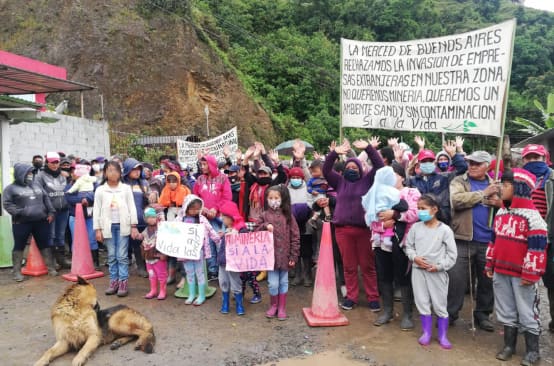
Ecuador: Stop the violence by the mining industry!
Hanrine, and Australian mining company, is trying to push through gold and copper mining in northern Ecuador against the express will of local people.
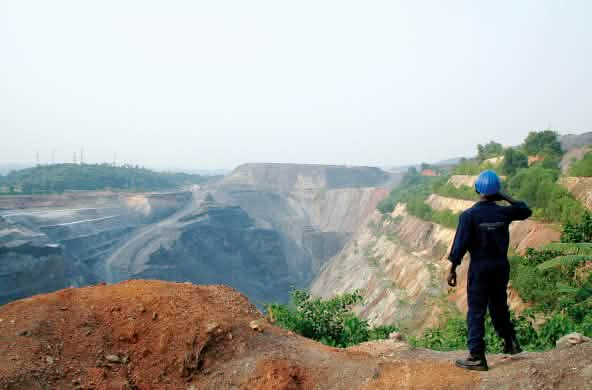
Gold
The romantic notion of gold prospecting has little in common with today’s mining operations. Find out about the environmental cost of our lust for gold – and what we can do to stop the insanity.
